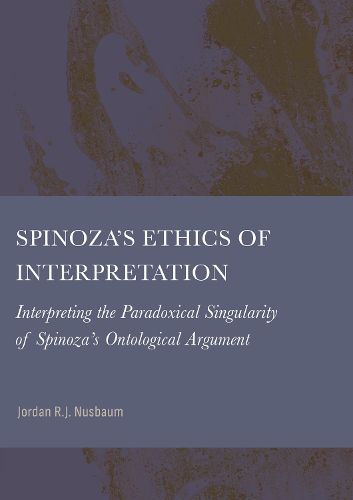Readings Newsletter
Become a Readings Member to make your shopping experience even easier.
Sign in or sign up for free!
You’re not far away from qualifying for FREE standard shipping within Australia
You’ve qualified for FREE standard shipping within Australia
The cart is loading…






This title is printed to order. This book may have been self-published. If so, we cannot guarantee the quality of the content. In the main most books will have gone through the editing process however some may not. We therefore suggest that you be aware of this before ordering this book. If in doubt check either the author or publisher’s details as we are unable to accept any returns unless they are faulty. Please contact us if you have any questions.
This book argues that the logic of Spinoza's ontological argument is supported by what the author describes as a paradox of singularity. This is because Spinoza's ontological schema posits that anything that exists must exist in such a way that its determinations follow either from what is "in-itself" or "in-another." This establishes a paradoxical ontology in which singular things (res singulares) are singularized or differentiated through an intersection of causes each of which must be conceived either in-themselves, in-another, or - as in the paradoxical case of the human being - both at once.
The author shows that Spinoza's ontological argument for the necessary existence of God constitutes a theory of action, way of being, or an ethos in which philosophy and religion are functionally identical. Yet, given the paradox of singularity that it involves, participation in this ethos presupposes a power of interpretation from which and for which individuals of a compatible nature strive to persevere in their being together.
The book will be of particular value to scholars who are interested in Spinoza's contributions to post-structuralism, trans-individuality, and the history of secular religious thought.
$9.00 standard shipping within Australia
FREE standard shipping within Australia for orders over $100.00
Express & International shipping calculated at checkout
This title is printed to order. This book may have been self-published. If so, we cannot guarantee the quality of the content. In the main most books will have gone through the editing process however some may not. We therefore suggest that you be aware of this before ordering this book. If in doubt check either the author or publisher’s details as we are unable to accept any returns unless they are faulty. Please contact us if you have any questions.
This book argues that the logic of Spinoza's ontological argument is supported by what the author describes as a paradox of singularity. This is because Spinoza's ontological schema posits that anything that exists must exist in such a way that its determinations follow either from what is "in-itself" or "in-another." This establishes a paradoxical ontology in which singular things (res singulares) are singularized or differentiated through an intersection of causes each of which must be conceived either in-themselves, in-another, or - as in the paradoxical case of the human being - both at once.
The author shows that Spinoza's ontological argument for the necessary existence of God constitutes a theory of action, way of being, or an ethos in which philosophy and religion are functionally identical. Yet, given the paradox of singularity that it involves, participation in this ethos presupposes a power of interpretation from which and for which individuals of a compatible nature strive to persevere in their being together.
The book will be of particular value to scholars who are interested in Spinoza's contributions to post-structuralism, trans-individuality, and the history of secular religious thought.